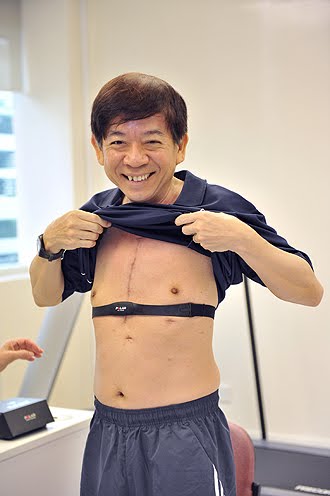The Straits Times front page
October 16, 2017
Record jumps in hospital, clinic attendance last year
Hospitals and clinics in Singapore have reported big increases in attendance, with an ageing population and people seeking medical help more readily - thanks to new government subsidies - seen as major factors.
Hospital admissions increased by a record 9 per cent last year compared with 2015. This is more than double the annual increases of up to 4 per cent in the past decade.
Similarly, polyclinic attendance rose by 8 per cent over 2015 - eclipsing the annual increases of 0.2 per cent to 4.9 per cent since 2007. Attendance at specialist outpatient clinics at public hospitals also spiked 5 per cent - the highest annual increase in a decade.
While hospital admissions rose in both the public and private sectors, the make-up of their patients is very different. Two in three patients admitted to private hospitals were aged 15 to 64, while only half of those in public hospitals were in this working age group.
Of the 555,284 hospital admissions last year, 425,691 were in public hospitals, with more than a third being patients above the age of 65 years.
The 8 per cent spike in patient visits at polyclinics saw the number of such visits hitting 5.3 million - almost 400,000 more than in 2015.
This is despite the Community Health Assist Scheme (Chas) subsidy that about half the population is entitled to when treated at a general practice (GP) clinic.
More than 2.5 million patient visits last year - compared with 1.3 million in 2014 - were made to GP clinics with subsidy from Chas or with the Pioneer Generation (PG) subsidy that 450,000 seniors enjoy.
Increasing numbers of patients with chronic conditions who qualify for the Chas subsidy are also turning to GP clinics. They made 675,000 visits to GP clinics last year, compared with 377,000 in 2015. Between Chas and the polyclinics, the Government subsidised 7.8 million primary care consultations last year.
Professor Philip Choo, who heads the National Healthcare Group, said new subsidies - including for those in the pioneer generation - for drugs and consultation provided by the Ministry of Health (MOH) at polyclinics and specialist outpatient clinics have fuelled the jump in demand at these facilities.
Pioneers are given the subsidy based on their age and not their economic status. This means that a pioneer who used to pay fully for a GP visit would be getting a subsidy for such visits since 2014.
An MOH spokesman said much of the increase is due to an ageing population, adding: "The elderly are more likely to have more frequent and severe acute conditions, as well as an increased prevalence of chronic conditions."
Also, she said there were spikes last year caused by an increased number of dengue cases in the early part of the year, and of hand, foot and mouth disease in the middle of the year. Roughly one in five people infected by dengue are hospitalised. More than 13,000 people had dengue last year.
The spokesman added: "MOH has redoubled efforts to keep healthcare sustainable and to meet the needs of our population."
October 16, 2017
Record jumps in hospital, clinic attendance last year
Hospitals and clinics in Singapore have reported big increases in attendance, with an ageing population and people seeking medical help more readily - thanks to new government subsidies - seen as major factors.
Hospital admissions increased by a record 9 per cent last year compared with 2015. This is more than double the annual increases of up to 4 per cent in the past decade.
Similarly, polyclinic attendance rose by 8 per cent over 2015 - eclipsing the annual increases of 0.2 per cent to 4.9 per cent since 2007. Attendance at specialist outpatient clinics at public hospitals also spiked 5 per cent - the highest annual increase in a decade.
While hospital admissions rose in both the public and private sectors, the make-up of their patients is very different. Two in three patients admitted to private hospitals were aged 15 to 64, while only half of those in public hospitals were in this working age group.
Of the 555,284 hospital admissions last year, 425,691 were in public hospitals, with more than a third being patients above the age of 65 years.
The 8 per cent spike in patient visits at polyclinics saw the number of such visits hitting 5.3 million - almost 400,000 more than in 2015.
This is despite the Community Health Assist Scheme (Chas) subsidy that about half the population is entitled to when treated at a general practice (GP) clinic.
More than 2.5 million patient visits last year - compared with 1.3 million in 2014 - were made to GP clinics with subsidy from Chas or with the Pioneer Generation (PG) subsidy that 450,000 seniors enjoy.
Increasing numbers of patients with chronic conditions who qualify for the Chas subsidy are also turning to GP clinics. They made 675,000 visits to GP clinics last year, compared with 377,000 in 2015. Between Chas and the polyclinics, the Government subsidised 7.8 million primary care consultations last year.
Professor Philip Choo, who heads the National Healthcare Group, said new subsidies - including for those in the pioneer generation - for drugs and consultation provided by the Ministry of Health (MOH) at polyclinics and specialist outpatient clinics have fuelled the jump in demand at these facilities.
Pioneers are given the subsidy based on their age and not their economic status. This means that a pioneer who used to pay fully for a GP visit would be getting a subsidy for such visits since 2014.
An MOH spokesman said much of the increase is due to an ageing population, adding: "The elderly are more likely to have more frequent and severe acute conditions, as well as an increased prevalence of chronic conditions."
Also, she said there were spikes last year caused by an increased number of dengue cases in the early part of the year, and of hand, foot and mouth disease in the middle of the year. Roughly one in five people infected by dengue are hospitalised. More than 13,000 people had dengue last year.
The spokesman added: "MOH has redoubled efforts to keep healthcare sustainable and to meet the needs of our population."









